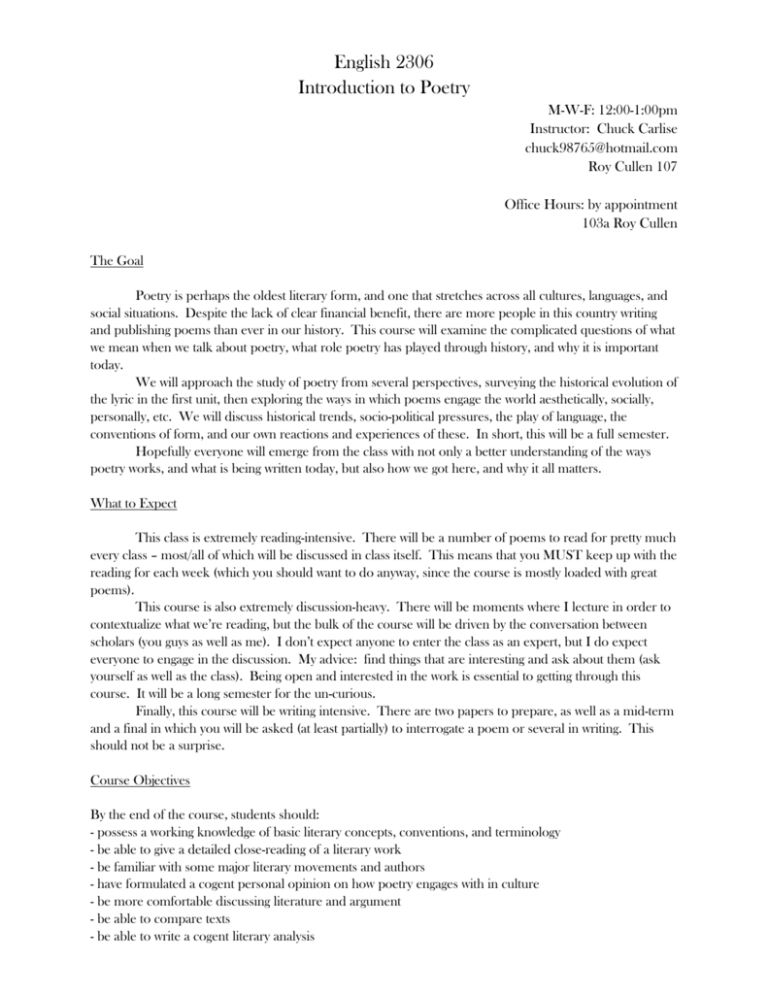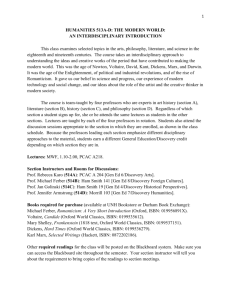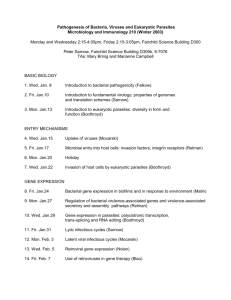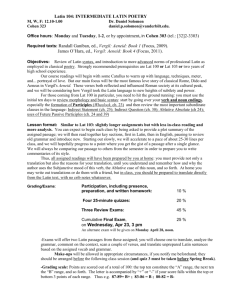Introduction to Poetry (15 week term)
advertisement

English 2306 Introduction to Poetry M-W-F: 12:00-1:00pm Instructor: Chuck Carlise chuck98765@hotmail.com Roy Cullen 107 Office Hours: by appointment 103a Roy Cullen The Goal Poetry is perhaps the oldest literary form, and one that stretches across all cultures, languages, and social situations. Despite the lack of clear financial benefit, there are more people in this country writing and publishing poems than ever in our history. This course will examine the complicated questions of what we mean when we talk about poetry, what role poetry has played through history, and why it is important today. We will approach the study of poetry from several perspectives, surveying the historical evolution of the lyric in the first unit, then exploring the ways in which poems engage the world aesthetically, socially, personally, etc. We will discuss historical trends, socio-political pressures, the play of language, the conventions of form, and our own reactions and experiences of these. In short, this will be a full semester. Hopefully everyone will emerge from the class with not only a better understanding of the ways poetry works, and what is being written today, but also how we got here, and why it all matters. What to Expect This class is extremely reading-intensive. There will be a number of poems to read for pretty much every class – most/all of which will be discussed in class itself. This means that you MUST keep up with the reading for each week (which you should want to do anyway, since the course is mostly loaded with great poems). This course is also extremely discussion-heavy. There will be moments where I lecture in order to contextualize what we’re reading, but the bulk of the course will be driven by the conversation between scholars (you guys as well as me). I don’t expect anyone to enter the class as an expert, but I do expect everyone to engage in the discussion. My advice: find things that are interesting and ask about them (ask yourself as well as the class). Being open and interested in the work is essential to getting through this course. It will be a long semester for the un-curious. Finally, this course will be writing intensive. There are two papers to prepare, as well as a mid-term and a final in which you will be asked (at least partially) to interrogate a poem or several in writing. This should not be a surprise. Course Objectives By the end of the course, students should: - possess a working knowledge of basic literary concepts, conventions, and terminology - be able to give a detailed close-reading of a literary work - be familiar with some major literary movements and authors - have formulated a cogent personal opinion on how poetry engages with in culture - be more comfortable discussing literature and argument - be able to compare texts - be able to write a cogent literary analysis Texts and Materials: Course Reader – available on Blackboard You MUST print this out. It is the textbook for the class. Grading: Attendance Policy This course RELIES on a conversation between people. Therefore, your presence is absolutely necessary. Also, we will be writing in class a fair amount, there will be a few quizzes and all assignments will be discussed at length in class, so it is in your best interest to be there at the time as well. You get five absences for free. No need to excuse yourself or ask permission. No doctor’s note, no coach’s note. They’re yours. On the sixth absence, your participation grade will automatically drop by half. On the seventh, you fail. We have only 42 scheduled class meetings, so seven absences is almost 20% of the course. Having a cell phone, iPod, or laptop out during class will be treated as an absence. As soon as class starts up, put this stuff away. I’m not a lecture-style professor anyway, but it also drives me nuts when people pull this stuff out in class, so if I see it, I won’t even feel bad marking you absent. Also, I may or may not bother telling you that you’ve been busted (in some cases, I won’t want to disrupt the flow of a conversation) but that doesn’t mean I didn’t see it. Don’t say I didn’t warn you. Grading Breakdown Participation 30% (This is the biggest portion of the class grade. That means I’m expecting people to be present, alert, and involved in the conversation.) Mid-Term Paper 20% Final Paper 20% (More on these over the course of the semester) Mid-Term 20% (The week after Spring Break) Quizzes 10% (There will be a few of these scattered over the semester – as needed. A couple are scheduled, any more will only happen if I feel like people aren’t keeping up with the reading. That means you guys are in charge of how many of these there are…) ** I reserve the right to adjust these as the semester wears on. However, nothing will be changed without telling the class** CALANDAR: Week 1 Mon. Jan. 17 Wed. Jan. 19 Fri. Jan. 21 Martin Luther King Day Intro stuff Defining Poetry Week 2 Mon. Jan. 24 Wed. Jan. 26 Baselines & Terms How to Talk About Poems Robert Hass – The World as Will and Representation Robert Hayden – Those Winter Sundays Fri. Jan. 28 *Quiz on Poetry Terms How to Talk About Poems Matthea Harvey – Pity the Bathtub its Forced Embrace of the Human Form Philip Larkin – Church Going Adrienne Rich – Diving into the Wreck Richard Wilbur – Love Calls Us to the Things of the World UNIT 1: Week 3 Mon. Jan. 31 Wed. Feb. 2 A (VERY) BRIEF HISTORY Ceremony: Ancient & Contemporary Renaissance: the Sonnet & the Lyric Petrarch – Rime 190 Petrarch – Rime 267 Sir Thomas Wyatt – Whoso List to Hunt William Shakespeare – Sonnet 130 William Shakespeare – from Romeo and Juliet Fri. Feb. 4 Early Modern: Transition Christopher Marlowe – The Passionate Shepherd to His Love John Donne – The Bait George Herbert – Death Jonathan Swift – A Description of Morning Week 4 Mon. Feb. 7 Romanticism: Blake & Politics William Blake – The Chimney Sweeper (I) William Blake – The Chimney Sweeper (E) William Blake – The Ecchoing Green (I) William Blake – The Garden of Love (E) Wed. Feb. 9 Romanticism: Sublime & the Importance of Now William Wordsworth – Composed Upon Westminster Bridge, Sept. 3, 1802 Samuel Taylor Coleridge – Kubla Khan Percy Shelley – Ozymandias Fri. Feb. 11 Romanticism: Negative Capability John Keats – Ode on a Grecian Urn Week 5 Mon. Feb 14 American Romanticism Wed. Feb. 16 American Gothic & the Private Interior Walt Whitman – Crossing Brooklyn Ferry Emily Dickinson – I Like the Look of Agony Emily Dickinson – Much Madness in Divinest Sense – Emily Dickinson – Tell All the Truth But Tell It Slant – Walt Whitman – When I Heard at the Close of Day Fri. Feb. 18 Victorian Pre-Modern: Transition Alfred Lord Tennyson – Lady of Shallott, parts I & IV William Butler Yeats – The Second Coming William Butler Yeats – Leda and the Swan Week 6 Mon. Feb. 21 Modernism: Psychology & Stream of Consciousness Gertrude Stein – from Tender Buttons James Joyce – from Ulysses Wed. Feb. 23 Modernism: Difficulty, Pessimism, & Making it New T.S. Eliot – Love Song of J.Alfred Prufrock Fri. Feb. 25 Modernism: Imagism Ezra Pound – In a Station of the Metro William Carlos Williams – Between Walls William Carlos Williams – Spring & All Week 7 Mon. Feb. 28 Modernism: Imagination v. Realism Wallace Stevens – Anecdote of the Jar Wallace Stevens – The Snow Man Robert Frost – Need of Being Versed in Country Things Wed. Mar. 2 The Other Modernism: Harlem Renaissance Sterling Brown – Memphis Blues Langston Hughes – Weary Blues Fri. Mar. 4 20th Century: The Banal & Ordinary W.H. Auden – Musee de Beaux Artes Frank O’Hara – The Day Lady Died Week 8 Mon. Mar. 7 20th Century Movements: Beat Generation Wed. Mar. 9 20th Century Movements: Confessionalism Allen Ginsberg – America Sylvia Plath – Lady Lazarus Fri. Mar. 11 th 20 Century Movements: Post-Modernism John Ashbery – Farm Implaments and Rutabegas in a Landscape Week 9 Mon. Mar. 14 Wed. Mar. 16 Fri. Mar. 18 Spring Break Spring Break Spring Break Week 10 Mon. Mar. 21 Wed. Mar. 23 Fri. Mar. 25 Review for Mid-Term MID-TERM EXAM * Mid-Term Paper Due Writing Day UNIT 2: Week 11 Mon. Mar. 28 Wed. Mar. 30 CONVERSATIONS Conversations with the Self Self, Directly Kim Addonizio – The Singing Lucille Clifton – Homage to My Hips Terrance Hayes – Blue Terrace Etheridge Knight – Welcome Back, Mr. K, Love of My Life James Wright – Lying in a Hammock on William Duffy’s Farm… Self in Motion Dave Berman – Snow Robert Browning – A Toccatta of Galuppi’s Stephen Dobyns – How to Like It Yusef Komunyakaa – Nude Interrogation Dorianne Laux – Fast Gas Sharon Olds – Satan Says Fri. Apr. 1 Self as Definition Rae Armantraut – Two, Three Nick Flynn – Emptying Town Eric Kocher – A Taxonomy of the Etiquette of Brandos Philip Larkin – High Windows W.S. Merwin – Some Last Questions Anne Sexton – With Mercy for the Greedy James Tate – Teaching the Ape to Write Poems Week 12 Mon. Apr. 4 Wed. Apr. 6 Fri. Apr. 8 Conversations with an Other The Absent Other Anne Bradstreet – A Letter to Her Husband… Billy Collins – This Much I Do Remember Terrance Hayes – Talk Paul Monnet – No Goodbyes Ruth Stone – Curtains James L. White – Making Love to Myself In Alter Ego/Persona Ai – She Didn’t Even Wave Fred Chappell – Narcissus & Echo Jeremy Glazier – To Harcamone, as Genet Jeffrey McDaniel – The Quiet World Carrie Oeding – I Have Been in Situations More Uncomfortable Than This John Yau – Borrowed Love Poems The Other, Under Pressure Louise Gluck – The Mirror Tony Hoagland – Lucky Marie Howe – The Attic George Merideth – XXX Pablo Neruda – Your Feet Cesare Pavese – Words for a Girlfriend Week 13 Mon. Apr. 11 Conversations with the World World in Motion/Anecdote Sherman Alexie – The Exaggeration of Despair Hayan Charara – Animals Countee Cullen – Incident Thomas Hardy – Channel Firing Alice Notley – from Decent of Alette Lawrence Ferlinghetti – Dog Richard Siken – from War of the Foxes Wed. Apr. 13 World as Addressee/Monolog Gwendolyn Brooks – Song for the Front Yard Marilyn Chin – Portrait of Self as Nation, 1990-1991 Robert Lowell – For the Union Dead Robert Pinsky – ABC Joe Wenderoth – Detailed History of the Western World Fri. Apr. 15 World as Listener/3rd Party Gabrielle Calvocoressi – Save Me Joe Louis Carolyn Forche – The Colonel Ben Lerner – from Angle of Yaw Larry Levis – Oldest Living Thing in L.A. Les Murray – The Cows on Killing Day Martha Serpas – Poem Found Patricia Smith – 34 Week 14 Mon. Apr. 18 Wed. Apr. 20 Fri. Apr. 22 Conversations with the Universe Meaning & Insignificance A.R. Ammons – So I Said I Am Ezra Stephen Crane – A Man Said to the Universe Albert Goldbarth – Laws of the Universe Gerard Manly Hopkins – God’s Grandeur Ranier Maria Rilke – First Elegy Gary Snyder – Why Log Truck Drivers Rise Earlier than Students of Zen On Death Paul Celan – Death Fugue Emily Dickinson – Because I Could Not Stop for Death Mark Doty – Tiara Brigit Pegeen Kelly – Song C.K. Williams – Fragment Life as a Situation Ashley Capps – April Edward Hirsch – Wild Gratitude Galway Kinnell – Why Regret? Maurice Manning – A Condensed History of Beauty Kent Shaw – I Can’t Believe We Could Take a Train Into the Earth Week 15 Mon. Apr. 25 Wed. Apr. 27 Fri. Apr. 29 Week 16 Mon. May 2 Catching up & tying up loose ends Presenting on Final Paper Presenting on Final Paper Evals & Closedown *Final Paper Due








